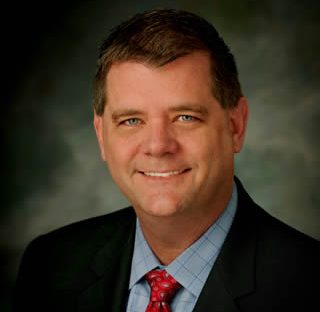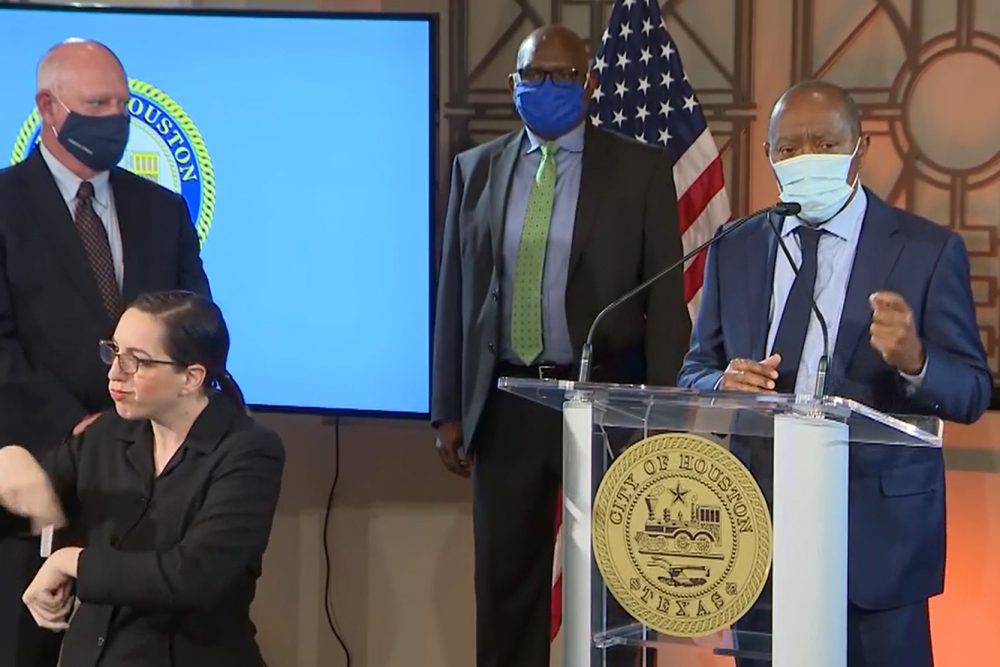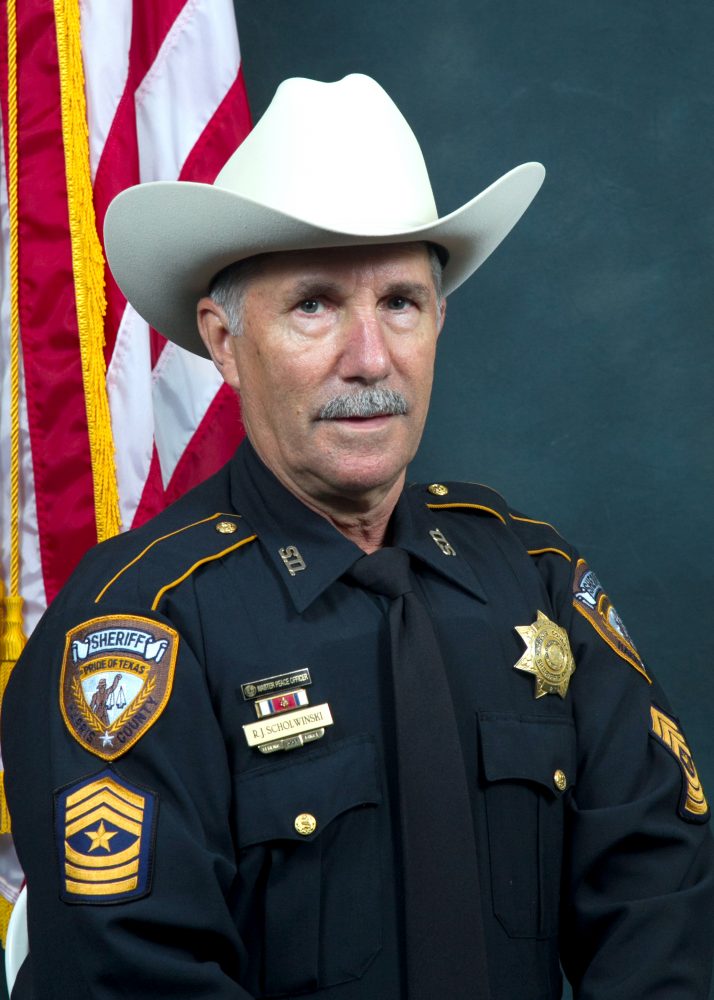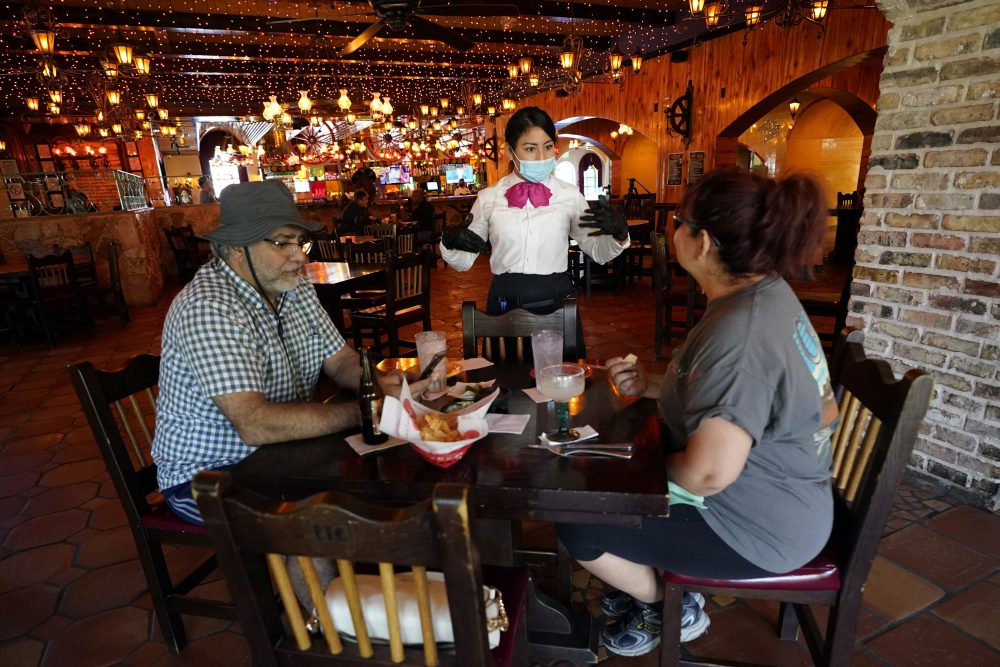This story is part of Houston Public Media's ongoing coronavirus coverage. To see our previous live coverage, click here.
Maps: Tracking COVID-19's Spread In Texas
Updated 4:13 p.m. CT Thursday
The Galveston County Health District will shut down its mass testing sites Friday, citing a lack of demand, County Judge Mark Henry said.
More than 4,800 people received tests at the district run sites. There are still operational testing sites in Galveston County, some run by local municipalities, Henry said.
Many of those sites are at urgent care centers and emergency rooms around the county.
The district was offering drive through testing in Texas City, Galveston, and most recently, in League City.
“On our first day of our new location in League City, I think we only had about 75 or 80 people get tested,” Henry said. “They had a capacity of 200…That's somewhat of a good sign that there's less demand for the testing."
Last Friday, Henry on Twitter touted the county’s test expansion efforts.
Here in @GalvCoTx we are leading the way in expanding our COVID-19 testing capabilities while doing our part to help support @GovAbbott w/ getting TX back to work.
Visit https://t.co/QzMfvwBJ2u for more information about the expanded testing options. #txlege pic.twitter.com/ewq25mrs34
— Judge Mark Henry (@JudgeMarkHenry) May 1, 2020
Of 19,784 tests total throughout Galveston County, 672 have come back positive, a rate lower than the state of Texas overall. About 7% of tests across the state have come back positive, while that rate is just above 3% in Galveston County. Twenty-eight people have died of the disease in the county.
Many of the cases throughout the county were found in nursing homes. Breakouts at assisted living facilities in Texas City, League City and Friendswood account for a total of 193 cases.
The health district said staff are being reassigned to their own public health programs, and the county is losing volunteers who are returning to work now that Gov. Greg Abbott has lifted restrictions on businesses opening.
—
Updated 4:13 p.m. CT Thursday
The city will spend an estimated $200 million to expand testing and contact tracing across Houston — roughly half of the money received from the federal government as part of the CARES Act.
COVID-19 recovery czar Marvin Odum on Thurday said his team has set up a plan for 24 new testing sites to pop up throughout the city by the end of the month. The new sites will be a combination of fixed sites and mobile testing units set up in segments over the next few weeks.
The city has gathered data from the Centers from Disease Control and Prevention to identify which zip codes in Houston have not received adequate testing, which will it will use to determine the different sites scattered across most of northwest and northeast Houston.
Odum said the city is working with the United Memorial Medical Center and the Texas Office of Emergency Management to get the necessary supplies, personal protective equipment and testing kits to meet the goal.
The supply chain, Odum said, has gotten considerably better over the last couple month, and he believed opening the 24 new sites by the end of the month is achievable.
The goal of contact tracing is to quickly notify people who may have come in contact with a positive case. Last week the city announced that it was hiring additional contact tracers. Right now, Odum said 125 people have filled those roles, 70 of which have been temporarily taken away from the other jobs.
City officials said they’re starting a recruitment effort to hire a total of 300 people.
—
Mayor Sylvester Turner on Thursday urged all Houstonians to continue adhering to coronavirus guidelines set by the city and county — even as the governor’s own executive orders have made enforcement nearly impossible.
The mayor spoke at a press conference announcing the expansion of its testing and contact tracing capacity, with funds from the federal CARES Act. But Turner and health officials on Thursday stressed that the most effective way of stopping the spread of COVID-19 is to wear masks, keep businesses closed and stay home — all restrictions that have now been lifted by Gov. Greg Abbott, as he continues to “reopen” the Texas economy.
Abbott on Thursday relaxed enforcement of his own regulations after a Dallas salon owner was arrested for opening her business, which was mandated to be closed during the pandemic under state law. In response, Abbott modified his order, eliminating jail time as an enforcement tool.
Turner said he was concerned things were moving too quickly, and that the steps that have already been taken in the region to stop the spread have worked — for now.
But a lack of enforcement will likely stifle some of those efforts. Turner said. Last week, when a strip club in Houston tried to open in defiance of Abbott’s order, the city shut it down. But the owner successfully sued to have it reopened, and when the city asked state Attorney General Ken Paxton to clarify whether strip clubs could remain open, Turner said he received no response.
Turner also said that when Abbott relaxed enforcement rules on face covering ordinances, public demand for masks went down.
The mayor said without enforcement, the order is just a “recommendation.”
“Once you take the enforcement mechanism out of the order, you really don’t have the order anymore,” Turner said. “You can’t enforce something that you can’t enforce.”
—
About 2,700 landlords have registered for the city’s rental assistance program in the program’s first five hours, Mayor Turner said.
—
The City of Houston will be honoring high school seniors in a unique way this year. Mayor Sylvester Turner says on the evening of June 5th, every graduating class in districts within city limits are invited back to campus for a virtual outdoor celebration.
There are roughly 25,000 graduating seniors in Houston high schools this year. Parents and family members can watch virtually, while students and faculty are invited to wear caps and gowns at the schools. The mayor hinted special guests will make an appearance.
"Our students may not have the prom to look back on and the field trips that they have lost, but I think collectively we can work together to put on a very special moment that says to our students that our city stands behind you," Turner said
High school seniors will return to their campuses in caps and gowns on June 5, and HISD is partnering with the city’s Office of Special Events, which will manage the celebration.
Details are still being worked out, but the district is exploring ideas like students simultaneously singing a popular song, viewing pre-recorded messages from celebrities, and taking group photos by drone.
The event is not a commencement, as no diplomas will be handed out.
The district will be releasing written instructions to students later this month.
—
A survey looking at the social and economic impact of COVID-19 shows that most people are struggling financially. The survey from nonprofit disaster relief group Harvey Home Connect found that rent assistance, financial assistance, and food and utility assistance are the highest needs. The survey also shows mental health was a concern, with 44% of respondents saying they haven't been able to relax in the past two weeks, and 21% saying they feel hopeless.
The survey is ongoing since March 23, and will help public officials better address needs in the community, the group said.
—
The U.S. Department of Transportation is giving METRO millions of dollars to help the agency recover from the coronavirus pandemic. The $248 million dollar grant is part of the federal CARES Act, and the money can be used for operating expenses and maintenance, along with employee salaries.
Bus ridership has plummeted since stay at home orders went into effect. METRO also hasn't been charging fares.
—
Kinder Morgan has donated $1 million to the Houston Food Bank, to help out an organization that has seen a roughly 150-percent increase in demand over the past couple of months, and which is distributing just under a million pounds of food a day. The food bank says each dollar donated becomes three meals for people in need.
—
Updated 8:30 p.m. CT Wednesday
A sergeant with the Harris County Sheriff's Office has died from COVID-19, officials announced Wednesday.
Sgt. Raymond Scholwinski was 70 years old and had been with the Sheriff's Office since 1979, where he started as a reserve deputy. He went on to serve as a full-time officer for 26 years.
Most recently he served as the day watch Contract Sergeant in District 2.
“Sgt. Scholwinski represented the best of the Harris County Sheriff’s Office family,” said Sheriff Ed Gonzalez in a press release. “Whether he was on patrol, making a neighborhood association presentation, or in the field during hurricanes, tropical storms, and other disasters, Ray consistently delivered for the people of Harris County. We will miss our brother and we will honor his legacy of service.”
A total of 256 sheriff's office employees have tested positive for COVID-19.
Updated 3:26 p.m. CT Wednesday
An inmate in the Harris County Jail who had tested positive for COVID-19 has died, marking the first coronavirus-related death connected with the jail. The news was confirmed by a spokesman with the Harris County Sheriff’s Office Wednesday.
Doctors confirmed the death Wednesday morning. The man was between 50 and 60 years old, and had been hospitalized for several weeks, the sheriff’s office said. He was booked into the Harris County Jail “several months ago” on an undisclosed felony charge, according to a spokesman for the sheriff.
The man is the first person to die from the coronavirus in the jail. The sheriff’s office was withholding the person’s identity in compliance with HIPAA regulations.
There have been 601 inmates who have tested positive for COVID-19 in the Harris County Jail. Of those, 14 are hospitalized, 92 are asymptomatic, and 249 are in recovery, according to the sheriff’s office. Forty-six inmates are awaiting results, and 478 have tested negative.
There have been 256 sheriff's office employees who have tested positive for the virus, 229 of whom work in the jail. An additional 402 are in quarantine for possible exposure, and 12 are currently hospitalized, the sheriff’s office confirmed Wednesday.
—
Updated 4:42 p.m. CT Tuesday
Mayor Sylvester Turner on Tuesday announced a plan to allocate $15 million for emergency rental assistance.
The proposal, which will go in front of the Houston City Council on Wednesday, would pull from $404 million in federal CARES Act funding, intended to be spent on COVID-19 relief. Under the proposed plan, local nonprofit Baker Ripley would run the program by distributing funding to landlords.
According to the mayor, landlords would apply to participate in the program and agree to waive any late fees, then their tenants could apply for the funding.
—
The number of people in immigrant detention who have tested positive for COVID-19 across Texas has more than quadrupled in two weeks, according to data from Immigration and Customs Enforcement.
A total of 155 cases have been confirmed at eight different facilities statewide, up from 36 on April 22.
That number does not include unaccompanied minors or staff members who have tested positive.
ICE has confirmed 21 COVID-19 cases at the Joe Corley Detention Center in Conroe.
Facilities outside Dallas and Abilene have also seen cases in the double digits in recent weeks, with dozens of detainees affected.
—
At least 15 people confirmed positive for COVID-19 were announced to have died over the weekend, and more than 130 people in total have died from the disease in the county, as Gov. Greg Abbott’s plan to lift restrictions on Texas businesses amid the pandemic moved forward.
Harris County Judge Lina Hidalgo and the Houston Health Department announced the weekend numbers on Twitter, bringing the total number of deaths in Harris County to 133 as of Monday morning. In the nine weeks since the virus arrived in the Houston area, there have been 6,838 confirmed cases in the county, 4,263 of which were still active as of Monday morning.
Abbott started lifting restrictions on businesses Friday, allowing all retail, restaurants, movie theaters and malls to reopen at 25% capacity. Museums and libraries can also reopen, but hands-on exhibits must remain closed, according to the order. Religious institutions were also permitted to expand capacity, and outdoor sports involving no more than four participants at any given time, which involve social distancing, could take place. Fewer restrictions were placed on all licensed health care professionals, but hospitals must still reserve 15% of capacity for COVID-19 patients.
The governor referred to the order as “phase one” in the process of “reopening” Texas, with a second phase coming as soon as May 18, allowing more businesses to open and more restrictions lifted. Such a reopening would come pending more than two weeks of medical data on hospitalization and death rates, though the governor did not announce a specific threshold for whether the plan would move forward.
Abbott’s executive order superseded all local orders, including orders from Hidalgo closing nonessential retail and limiting restaurant service, and mandating the wearing of masks in public. But Hidalgo on Friday asked the public to keep abiding by the county’s recommendations, even if they are no longer legally enforceable, saying that not doing so could lead to a resurgence in the virus that could overwhelm the health care system.
"If these doctors and these nurses get overwhelmed, people die en masse," Hidalgo said Friday. "Plain and simple."
Not all public officials took the same position as Hidalgo. Some local leaders, arguing that Abbott’s orders were too vague, attempted to reopen all businesses Friday, prompting Attorney General Ken Paxton to step in and clarify that hair salons, gyms and other businesses were still not allowed to reopen.
Meanwhile, some restaurants have opted not to reopen at all.

 75 °F
75 °F



